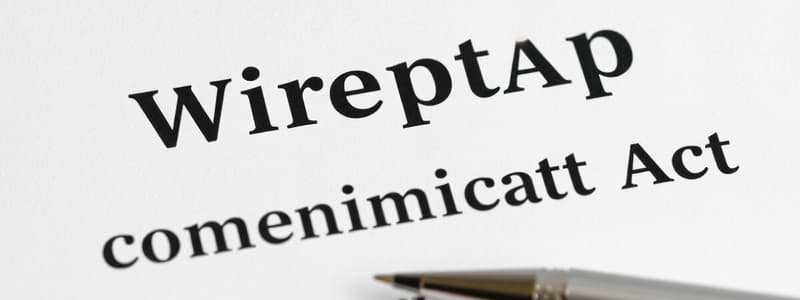Podcast
Questions and Answers
Which federal statute primarily governs the interception of communications?
Which federal statute primarily governs the interception of communications?
- Stored Communications Act
- Fourth Amendment
- Pen Register Act
- Wiretap Act (correct)
The Stored Communications Act allows law enforcement to access stored electronic communications without a warrant.
The Stored Communications Act allows law enforcement to access stored electronic communications without a warrant.
True (A)
What does the Pen Register Act regulate?
What does the Pen Register Act regulate?
The use of devices that record dialing, routing, addressing, and signaling information.
The _________ Amendment provides protection against unreasonable searches and seizures.
The _________ Amendment provides protection against unreasonable searches and seizures.
Match the following acts with their primary focus:
Match the following acts with their primary focus:
Flashcards
ECPA
ECPA
Electronic Communications Privacy Act - a US law regulating the interception and access of electronic communications.
Fourth Amendment
Fourth Amendment
Guarantees the right of the people to be secure in their persons, houses, papers, and effects, against unreasonable searches and seizures.
Wiretap Act
Wiretap Act
Part of ECPA, limits wiretaps to specific circumstances, requiring warrants and court oversight.
SCA
SCA
Signup and view all the flashcards
Pen Register Act
Pen Register Act
Signup and view all the flashcards
Study Notes
ECPA: Comparing Wiretap Act, SCA, and Pen Register Act
-
Wiretap Act (18 U.S.C. §§ 2510-2522): Applies to interception of communications in flight. It strictly controls "interception," defined as acquiring the contents of a communication through electronic, mechanical, or other devices, during transmission. Consent from one party to the communication voids the Act's application. It doesn't apply to service providers intercepting communications.
-
Stored Communications Act (SCA) (18 U.S.C. §§ 2701-2711): Addresses accessing communications in electronic storage (including ISP records). Governement needs a warrant or court order to obtain stored communications, applying differently to stored data based on length of storage. Consent by the subscriber prevents the law from applying. It doesn't apply to service provider access of communications.
-
Pen Register Act (18 U.S.C. §§ 3121-3127): Regulates pen registers and trap and trace devices. Court orders are necessary before use. The government must demonstrate that information obtained is pertinent to a criminal investigation.
Court Orders and Procedures
-
Wiretap Act: Court orders must detail the reasons for interception, how it will occur, and its duration. Requires the judge to find probable cause, assess whether alternatives were considered, and confirm the necessity to minimize the interception of non-target communications. Only high-level government prosecutors can request orders related to specific crimes.
-
Stored Communications Act: Government must obtain a warrant (supported by probable cause) or prior notice plus a subpoena if communications have been stored for less than 180 days. Prior notice and a subpoena are not required if communications have been stored for more than 180 days.
-
Pen Register Act: Government needs a court order for pen registers and trap-and-trace devices. The court must ensure that the sought information is relevant to an ongoing criminal investigation.
Exceptions and Exclusions
- Wiretap Act: Consent from one party to the intercepted communication prevents application of the law.
- Stored Communications Act: Consent from the subscriber prevents the Act from applying. The Act doesn't apply to service providers accessing stored communications.
- Pen Register Act: No specific exception is mentioned.
Penalties and Damages
- Wiretap Act: Damages of at least $10,000 per violation, plus up to five years' imprisonment.
- Stored Communications Act: Damages of at least $1,000 per violation, plus up to one year imprisonment (penalties increase if the violation is for commercial gain).
- Pen Register Act: Fines instead of damages, with up to one year imprisonment.
Fourth Amendment vs. Federal Electronic Surveillance Law Comparison
-
Applicability: Fourth Amendment applies to electronic surveillance when there's a reasonable expectation of privacy, governing government actions. Federal law applies regardless of expectation of privacy, including to private parties accessing stored communications.
-
Judicial Authority: Fourth Amendment warrants typically require probable cause, while federal law allows various judicial actions, including subpoenas and court orders.
-
Duration: Fourth Amendment warrants typically have a narrower duration, while federal surveillance authorities often have broader durations.
-
Enforcement: Both rely on the exclusionary rule, although federal surveillance law sometimes has exceptions to its application.
Studying That Suits You
Use AI to generate personalized quizzes and flashcards to suit your learning preferences.
Related Documents
Description
Explore the key differences between the Wiretap Act, Stored Communications Act, and the Pen Register Act. This quiz delves into their definitions, requirements for consent, and application scope. Test your understanding of these important legal frameworks governing electronic communications.

